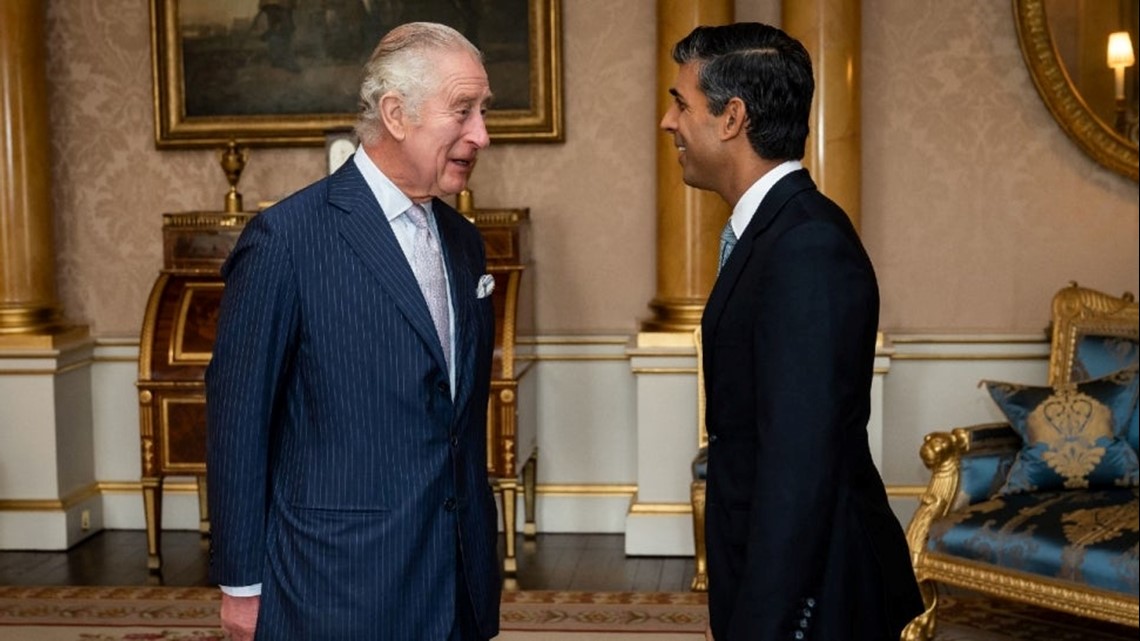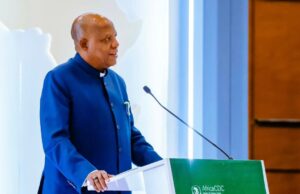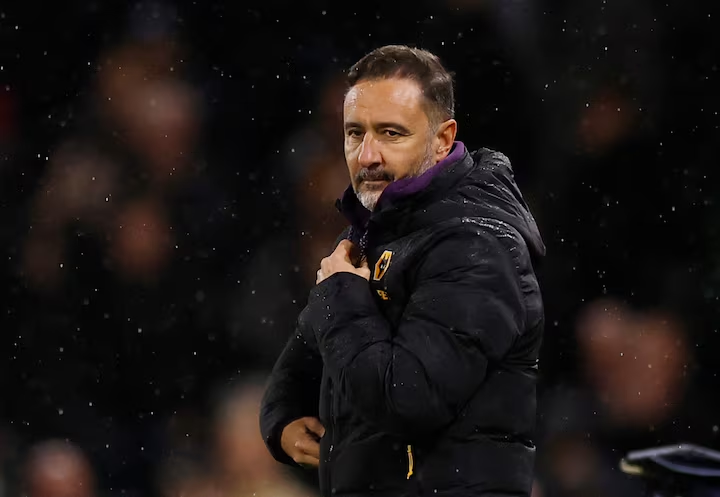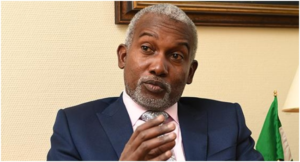
Rishi Sunak became Britain’s third prime minister of the year on Tuesday, tasked with taming an economic crisis that has left the country’s finances in a precarious state and millions struggling to pay their food and energy bills.
Sunak, who is the U.K.’s first leader of color, met King Charles III at Buckingham Palace, where the monarch officially asked the new leader of the governing Conservative Party to form a government, as is tradition.
Sunak clinched the leadership position Monday, seen by his party as a safe pair of hands it hopes will stabilize an economy sliding toward recession, and stem its own plunging popularity, after the brief, disastrous term of Liz Truss.
Her package of unfunded tax cuts spooked financial markets with the prospect of ballooning debt, drove the pound to record lows and forced the Bank of England to intervene — weakening Britain’s fragile economy and obliterating her authority within her party.
Sunak — at 42 the youngest British leader in more than 200 years — acknowledged the scale of his challenge as well as the skepticism of a British public alarmed at the state of the economy and weary of a Conservative Party soap opera that has chewed through two prime ministers in as many months.
“I fully appreciate how hard things are,” Sunak said outside the prime minister’s 10 Downing Street residence. “And I understand, too, that I have work to do to restore trust after all that has happened. All I can say is that I am not daunted.”
When he was Treasury chief, Sunak became popular with the public by handing out billions in support to shuttered businesses and laid-off workers during the COVID-19 pandemic.
But now he will have to oversee tax hikes and public spending cuts as he tries to bring inflation and government debt under control.
Acknowledging “difficult decisions to come,” Sunak tried to draw a line under the chaos that engulfed Truss and her predecessor, Boris Johnson. He said his government “will have integrity, professionalism and accountability at every level.”
Opponents already depict Sunak as out of touch with the concerns of ordinary people because of his privileged private school background, previous career as a hedge fund manager and vast wealth.
Sunak “comes into office as not a particularly popular prime minister, but with a reputation for some semblance of economic competence,” said Alan Wager, research associate at the think tank U.K. in a Changing Europe. “The problem will be is he is seen as someone that’s not broadly on the side of people. He’s seen as someone that’s broadly out of touch.”
Much of Sunak’s fortune comes through his wife Akshata Murty, whose father is the billionaire founder of Indian IT firm Infosys. The couple is worth 730 million pounds ($826 million), according to the Sunday Times Rich List.
In April 2022, it emerged that Murty did not pay U.K. tax on her overseas income. The practice was legal — and Murty soon agreed to relinquish it — but it looked bad at a time when millions of Britons were struggling to make ends meet.
Sunak’s top priorities will be appointing Cabinet ministers, and preparing for a budget statement that will set out how the government plans to come up with billions of pounds (dollars) to fill a fiscal hole created by soaring inflation and a sluggish economy — and exacerbated by Truss’ destabilizing time in office.
That statement, set to feature tax increases and spending cuts, is currently due to be made in Parliament on Monday by Treasury chief Jeremy Hunt — if Sunak keeps him in the job.
Truss departed Tuesday after making a defiant public statement outside 10 Downing Street, seven weeks to the day after she was appointed prime minister. She announced her resignation on Thursday, acknowledging she could not deliver on her economic plans.
In her departing words Truss offered a defense of her low-tax vision and her brief term in office — despite the market mayhem triggered by her Sept. 23 budget package.
“I am more convinced than ever that we need to be bold and confront the problems we face,” she said, before wishing Sunak success as “our country continues to battle through a storm.”
Sunak’s victory is a remarkable reversal of fortune just weeks after he lost to Truss in a Conservative election to replace Johnson. Party members chose her tax-cutting boosterism over his warnings that inflation must be tamed.
Sunak was chosen as Conservative leader after becoming the only candidate to clear the hurdle of 100 nominations from fellow lawmakers to run in the party election. Sunak defeated rival Penny Mordaunt, who may get a job in his government, and the ousted Johnson, who dashed back from a Caribbean vacation to rally support for a comeback bid but failed to get enough backing to run.
As well as stabilizing the U.K. economy, Sunak must try to unite a governing party that has descended into acrimony as its poll ratings have plunged.
Conservative lawmaker Victoria Atkins, a Sunak ally, said the party would “settle down” under Sunak.
“We all understand that we’ve now really got to get behind Rishi — and, in fairness, that’s exactly what the party has done,” she told radio station LBC.







